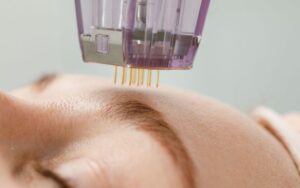
Laser liposuction, or laser lipo, has emerged as a popular choice for individuals seeking non-invasive fat reduction and body contouring.
This technique utilizes laser energy to target and liquefy fat cells, which can be naturally expelled by the body.
While laser lipo is generally considered safe and effective, questions about its potential risks, including the possibility of organ damage, have surfaced.
What is Laser Lipo Treatment?

Laser lipo is known for being minimally invasive compared to traditional fat removal methods.
It is a process that uses laser technology to break down fat cells. A tiny laser fiber is inserted under the skin, and the laser’s heat causes fat cells to break apart. Once these cells are broken down, your body naturally processes and removes them.
Laser Lipo Vs Traditional Liposuction: What is the Difference?
Traditional liposuction involves manually making larger incisions to remove fat using a hollow tube called a cannula. This method can lead to longer recovery times and more noticeable scarring.
In contrast, laser lipo uses controlled heat to liquefy fat cells, making removal easier and less traumatic on your body. The smaller incisions required for laser lipo mean less scarring and quicker healing.
What Are the Side Effects of Laser Lipo?
Swelling, redness, and bruising at the treatment site are expected. These tend to go away within a few days to weeks.
You could also feel some pain or discomfort around the treated area. Less commonly, you might notice skin sensitivity or a tugging sensation.
Common Side Effect of Laser Lipo
- Swelling, Bruising (ecchymosis), and Redness
- Mild Pain or Discomfort
- Temporary Numbness or Altered Sensation
Potential Side Effects of Laser Lipo
- Skin Irregularities and Contour Asymmetry
- Thermal Burns or Skin Damage
- Infection
- Seroma or Hematoma
Rare but Severe Complications
- Fat Embolism
- Internal Organ Injury
| Side Effect Type | Manifestations & Contributing Factors | Duration/Risk Probability |
|---|---|---|
| | Common & Temporary Effects | |
| Redness, Bruising & Swelling | Capillary damage from laser heat; common in treated areas (e.g., abdomen, thighs) | Resolves in 1–3 weeks (90%+ cases) |
| Local Pain or Numbness | Heat/tingling from nerve irritation; frequent in delicate areas (e.g., face, neck) | 48 hours–3 months (mostly <7 days) |
| Temporary Pigment Changes | Hyper/hypopigmentation in darker skin tones due to melanocyte activation | Gradual recovery over 3–6 months |
| | Less Common Complications | |
| Burns or Scarring | Epidermal damage from improper settings/technique; severe cases may cause full-thickness necrosis | Incidence: 1%–3% |
| Infection | Poor aftercare or contaminated tools; symptoms: fever, pus | Probability <1% (requires urgent care) |
| Skin Irregularities | Uneven fat removal or poor elasticity (e.g., aging, postpartum) causing dimpling or waves | May persist; assess after 3–6 months |
| | Long-Term/Special Risks | |
| Skin Laxity | Accelerated collagen loss in >50-year-olds; may cause jawline sagging or cheek drooping | 30%–50% higher risk in elderly |
| Fat Embolism Syndrome | Liquefied fat entering blood vessels → pulmonary blockage (dyspnea, cyanosis); rare but life-threatening | <0.1%; typically within 24 hours |
| Fat Redistribution & Rebound | Remaining fat cells expand; weight gain >5kg may cause fat accumulation in untreated areas (e.g., back) | May require touch-ups after 6–12 months |
Can Laser Lipo Damage Organs?

No, laser liposuction does not directly damage internal organs. The laser energy is carefully targeted to only affect the fat cells under the skin, leaving deeper tissues and organs unharmed.
The laser light used in laser lipo can only penetrate the skin to a certain depth, precisely targeting the fat cells without reaching the internal organs.
Can Laser Lipolysis Cause Cancer?
No, there is no scientific evidence to suggest that laser lipolysis can cause cancer.
While some early studies suggested a potential for light-based therapies to affect cancer cells, current evidence on the direct link between laser lipo and cancer remains inconclusive and lacks robust scientific support. Liposuction techniques, including laser lipolysis, have been around for several decades, and if there were a significant risk of cancer, it would likely have been identified by now through long-term studies or clinical observations.
Can Laser Lipo Cause Infection?
Laser lipolysis has a significantly lower risk of infection compared to traditional liposuction.
Studies indicate that the infection rate for non-invasive laser lipo is less than 0.1%, while traditional liposuction has an infection rate of approximately 2.0% due to surgical incisions.
The risk of infection largely depends on the sterilization of the equipment and the cleanliness of the treatment area. Laser paddles and other devices must undergo rigorous sterilization procedures, and the skin is usually pre-cleaned to minimize contamination risks.
Individuals with compromised immune systems or those on certain medications may be at a higher risk of developing infections after any cosmetic procedure, including laser lipo.
What Are the Benefits of Laser Lipo?
Fat Reduction and Body Contouring
Laser lipo offers targeted fat reduction, allowing you to focus on areas like the abdomen, thighs, and hips. It uses laser energy to break down fat cells, making it effective for body contouring. Because it’s so precise, you can achieve noticeable changes in body shape.
Skin Tightening and Collagen Production
Besides reducing fat, laser lipo also encourages skin tightening. The laser energy heats the skin, promoting collagen production. Collagen is key for skin elasticity and can make your skin look smoother and firmer.
Choose Your Laser Lipo Machine Supplier

Osano professional LED light therapy machine is a non-invasive, medical-grade device utilizing 532nm green low-level laser therapy (LLLT) technology.
It specializes in body slimming, cellulite reduction, and body sculpting by stimulating fat emulsification and lymphatic drainage. Features include a 9.7-inch touch screen, 360° rotating laser heads, and consistent energy output for salon or clinical use.
Why Choose Our Machine?
- Fast, Visible Results: Clients see improvements in as little as 2 weeks thanks to powerful 800-1200mW energy per probe.
- Effortless Operation: Intuitive 9.7-inch color touchscreen and 360° rotating laser heads make treatments smooth and efficient – reduce staff training time.
- Maximize Profits: Target high-value areas (thighs, abdomen, arms, back) with zero downtime. Attract clients seeking alternatives to surgery.
Frequently Asked Questions
Is laser lipo bad for your liver?
No significant risk if liver is healthy. It destroyed fat cells are metabolized via lymphatic system which processed by liver and excreted naturally.
Is laser lipo safe for the stomach?
Yes. The non-invasive laser energy targets subcutaneous fat without damaging abdominal organs
Does laser hair removal affect the liver?
No direct impact. Laser only penetrates 1–4mm depth (dermis layer), targeting hair follicles’ melanin.
What are the non-invasive alternatives to laser lipo
CoolSculpting is an ideal choice. Futhrmore, I-Lipo and SmartLipo are laser-based but less invasive than traditional lipo.
Can laser liposuction treatment have an impact on fertility?
There is no direct evidence to suggest that laser liposuction impacts fertility. Always consult your doctor if you have concerns related to reproductive health before undergoing the procedure.






